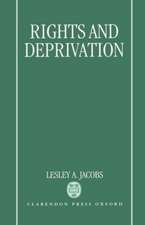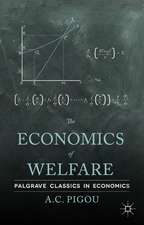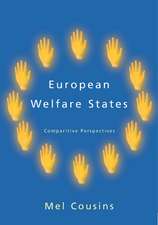The Scandinavian International Society: Primary Institutions and Binding Forces, 1815-2010: New International Relations
Autor Laust Schouenborgen Limba Engleză Hardback – 18 iul 2012
Schouenborg aims to take the next big step in the theoretical development of the English School of International Relations - particularly the structural version introduced by Barry Buzan. He analyses the formation of a Scandinavian regional international society over a 200-year period and develops the concepts of ‘primary institutions’ and ‘binding forces’ as an analytical framework. In doing so, he not only offers one of the first systematic applications of English School structural theory, but also sheds a new comparative light on the distinctiveness of Scandinavian international relations, and provides a novel intervention in the debates about the emergence of the so-called Nordic Peace. In the first part of the book Schouenborg explains the core concepts and discusses how one may distinguish a regional international society from the broader global international society in which it is embedded. In the second part he provides an in-depth study of the Scandinavian case, focussing on the periods 1815 to 1919; 1919 to 1989; and 1989 to 2010.
The Scandinavian International Society will be of interest to students and scholars of international relations theory, Scandinavian international relations and history, and researchers engaged in comparative welfare state studies.
| Toate formatele și edițiile | Preț | Express |
|---|---|---|
| Paperback (1) | 299.52 lei 6-8 săpt. | |
| Taylor & Francis – 16 iun 2017 | 299.52 lei 6-8 săpt. | |
| Hardback (1) | 822.54 lei 6-8 săpt. | |
| Taylor & Francis – 18 iul 2012 | 822.54 lei 6-8 săpt. |
Din seria New International Relations
-
 Preț: 295.14 lei
Preț: 295.14 lei -
 Preț: 424.75 lei
Preț: 424.75 lei -
 Preț: 393.17 lei
Preț: 393.17 lei -
 Preț: 310.70 lei
Preț: 310.70 lei -
 Preț: 277.04 lei
Preț: 277.04 lei - 18%
 Preț: 949.47 lei
Preț: 949.47 lei -
 Preț: 387.16 lei
Preț: 387.16 lei - 18%
 Preț: 1055.51 lei
Preț: 1055.51 lei - 18%
 Preț: 1167.71 lei
Preț: 1167.71 lei - 18%
 Preț: 1053.95 lei
Preț: 1053.95 lei -
 Preț: 469.64 lei
Preț: 469.64 lei -
 Preț: 448.86 lei
Preț: 448.86 lei - 18%
 Preț: 1058.79 lei
Preț: 1058.79 lei - 15%
 Preț: 434.52 lei
Preț: 434.52 lei -
 Preț: 416.22 lei
Preț: 416.22 lei - 28%
 Preț: 819.91 lei
Preț: 819.91 lei -
 Preț: 446.53 lei
Preț: 446.53 lei -
 Preț: 412.52 lei
Preț: 412.52 lei - 25%
 Preț: 853.07 lei
Preț: 853.07 lei - 18%
 Preț: 1112.34 lei
Preț: 1112.34 lei -
 Preț: 431.35 lei
Preț: 431.35 lei - 18%
 Preț: 1113.95 lei
Preț: 1113.95 lei - 28%
 Preț: 821.46 lei
Preț: 821.46 lei -
 Preț: 484.47 lei
Preț: 484.47 lei - 15%
 Preț: 485.91 lei
Preț: 485.91 lei - 18%
 Preț: 1272.54 lei
Preț: 1272.54 lei - 18%
 Preț: 1060.52 lei
Preț: 1060.52 lei - 24%
 Preț: 337.39 lei
Preț: 337.39 lei - 18%
 Preț: 1059.84 lei
Preț: 1059.84 lei -
 Preț: 410.50 lei
Preț: 410.50 lei - 18%
 Preț: 1060.52 lei
Preț: 1060.52 lei -
 Preț: 472.82 lei
Preț: 472.82 lei - 18%
 Preț: 1058.79 lei
Preț: 1058.79 lei - 28%
 Preț: 819.09 lei
Preț: 819.09 lei - 18%
 Preț: 1056.63 lei
Preț: 1056.63 lei - 18%
 Preț: 1118.46 lei
Preț: 1118.46 lei - 18%
 Preț: 1055.51 lei
Preț: 1055.51 lei - 18%
 Preț: 1052.35 lei
Preț: 1052.35 lei -
 Preț: 308.76 lei
Preț: 308.76 lei - 18%
 Preț: 1147.69 lei
Preț: 1147.69 lei
Preț: 822.54 lei
Preț vechi: 1104.33 lei
-26% Nou
Puncte Express: 1234
Preț estimativ în valută:
157.39€ • 164.33$ • 130.26£
157.39€ • 164.33$ • 130.26£
Carte tipărită la comandă
Livrare economică 05-19 aprilie
Preluare comenzi: 021 569.72.76
Specificații
ISBN-13: 9780415519236
ISBN-10: 0415519233
Pagini: 240
Ilustrații: 3 b/w images, 13 tables and 3 line drawings
Dimensiuni: 156 x 234 x 19 mm
Greutate: 0.6 kg
Ediția:1
Editura: Taylor & Francis
Colecția Routledge
Seria New International Relations
Locul publicării:Oxford, United Kingdom
ISBN-10: 0415519233
Pagini: 240
Ilustrații: 3 b/w images, 13 tables and 3 line drawings
Dimensiuni: 156 x 234 x 19 mm
Greutate: 0.6 kg
Ediția:1
Editura: Taylor & Francis
Colecția Routledge
Seria New International Relations
Locul publicării:Oxford, United Kingdom
Public țintă
Postgraduate and UndergraduateCuprins
1. Introduction Part 1: The Analytical Framework 2. Regional International Societies, Primary Institutions and Binding Forces 3. Applying English School Structural Theory 4. Exceptionalism and Post-Westphalian Regional International Societies Part 2: The Scandinavian Case Study 5. Primary Institutions – 1815-1919 6. Binding Forces – 1815-1919 7. Primary Institutions – 1919-1989 8. Binding Forces – 1919-1989 9. Primary Institutions 1989-2010 10. Binding Forces – 1989-2010 11. Conclusion
Recenzii
"Laust Schouenborg has confronted the exceptionalist discourse on international society seen in the Nordic region with the thoughts of the English School on regional international society. The result is well-researched, designed and carried out. Particular reference is made to the idea of ‘the Nordic Peace’ and to the notion of solidarity in Nordic foreign policy. Using a strong set of indicators Laust finds good reason for the existence of a Scandinavian international society. A good read for those interested in how international relations can sometimes turn out right!" - Clive Archer, Emeritus Professor, Manchester Metropolitan University
"In this important book, Schouenborg chronicles the development of a Scandinavian (-Baltic) international society over a period of 200 years. The book will be interesting news for IR-theorists because it develops a coherent analytical framework which clarifies the forces behind the development of regional international society. This represents a strengthening of English School theory. In terms of concrete analysis we are offered—for the first time—a comprehensive and convincing understanding of how the Scandinavian international society developed over time and how it came to include the Baltic states." - Georg Sørensen, Professor, Aarhus University, Denmark
"In this important book, Schouenborg chronicles the development of a Scandinavian (-Baltic) international society over a period of 200 years. The book will be interesting news for IR-theorists because it develops a coherent analytical framework which clarifies the forces behind the development of regional international society. This represents a strengthening of English School theory. In terms of concrete analysis we are offered—for the first time—a comprehensive and convincing understanding of how the Scandinavian international society developed over time and how it came to include the Baltic states." - Georg Sørensen, Professor, Aarhus University, Denmark
Descriere
This book provides a comprehensive analysis of Scandinavia as a regional international society, including the Nordic Peace and the rise of the Scandinavian welfare state.
















